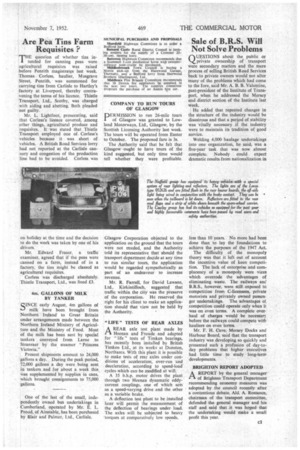Are Pea Tins Farm Requisites ?
Page 39

If you've noticed an error in this article please click here to report it so we can fix it.
question of whether tins in tended for canning peas were agricultural requisites was raised before Penrith magistrates last week. Thomas Carless, haulier, Musgrave Street, Penrith, was summoned for carrying tins from Carlisle to Hartley's factory at Liverpool, thereby contravening the terms of his licence. Thistle Transport, Ltd., Scotby, was charged with aiding and abetting. Both pleaded not guilty.
Mr. L. Lightfoot, prosecuting, said that Corless's licence covered, among other things, agricultural produce and requisites. It was stated that Thistle Transport employed one of CorIess's vehicles because it was short of vehicles. A British Road Services lorry had not reported at the Carlisle cannery and congestion of the production line had to be avoided. Oarless was on holiday at the time and the decision to do the work was taken by one of his drivers.
Mr. Edward Fraser, a traffic examiner, agreed that if the peas were canned on a farm, instead of in a factory, the tins might be classed as agricultural requisites.
Carless was discharged absolutely. Thistle Transport, Ltd., was fined D.
4m. GALLONS OF MILK BY TANKER
SINCE early August, 4m gallons of milk have been brought from Northern Ireland to Great Britain under arrangements made between the Northern Ireland Ministry of Agriculture and the Ministry of Food. Most of the milk has been sent by special tankers conveyed from Larne to Stranracr by the steamer "Princess Victoria."
Present shipments amount to 24,000 gallons a day. During the peak period, 72,000 gallons a day were being sent in tankers and for about a week this Was supplemented by supplies in cans, which brought consignments to 75,000 gallons.
One of the last of the small, independently owned bus undertakings in Cumberland, operated by Mr. E. L. Proud, of Ainstable, has been purchased by Blair and Palmer, Ltd., Carlisle. COMPANY TO RUN TOURS OF GLASGOW
PERMISSION to run 26-mile tours of Glasgow was granted to Lowland Motorways, Ltd., Glasgow, by the Scottish Licensing Authority last week. The tours will be operated from Easter to October. The Proposed fare is 38.
The Authority said that he felt that Glasgow ought to have tours of the kind suggested, but only time would tell whether they were profitable.
Glasgow Corporation objected to the application on the ground that the tours were not rreeded, and the Authority told its representative that should the transport department decide at any time to run similar tours, the application would be regarded sympathetically as part of an endeavour to increase revenue.
Mr. R. Farrell, for David Lawson, Ltd., Kirkintilioch, suggested that traffic within the city was the preserve of the corporation. He reserved the right for his client to make an application should that view not be held by the Authority_
"LIFE" TESTS OF REAR AXLES
AREAR axle test plant made by Heenan and Fronde and adapted for " life " tests of Timken bearings, has recently been installed by British Timken Ltd., at its works at Dunstan, Northants. With this plant it is possible to make tests of rear axles under conditions of acceleration, over-run and deceleration, according to speed-load cycles.which can be modified at will.
A 35 b.h.p. motor drives the plant through two Heenan dynamatic eddycurrent couplings, one of which acts as a speed-varying drive and the other as a variable brake.
A deflection test plant to be installed later will permit he measurement of the deflection of bearings under load. The axles will be subjected to heavy torques at comparatively low speeds.
Sale of .B.R.S. Will Not Solve Problems QUESTI 0 N S about the public or 1.-4 private ownership of transport were secondary matters and the mere process of selling British Road Services back to private owners would not alter many of the problems which had come to the fore, said Mr. A. B. B. Valentine, past-president of the Institute of Transport, when he addressed the Mersey• and district section of the Institute last week.
He added that repeated changes in the structure of the industry would be disastrous and that a period of stability was vitally necessary if the industry were to maintain its tradition of good service.
Welding 4,000 haulage undertakings into one organization, he said, was a five-year task that was now almost complete. Nobody could expect dramatic results from nationalization in less than 10 years. No more had been done than to lay the foundations to achieve the purposes of the 1947 Act.
The difficulty of the monopoly theory was that it left out of account the incentive value of keen competition. The lack of enterprise and complacency of a monopoly were vices which overrode the advantages of eliminating waste. The railways anC B.R.S., however, were still exposed to competition from C-licensees, private motorists and privately owned passenger undertakings. The advantages al. competition could operate only when it was on even terms. A complete overhaul of charges would be necessary before the railways could compete with hauliers on even terms.
Mr. F. H. Cave; Mersey Docks and Harbour Board, said that the transport industry was developing so quickly and presented such a profusion of day-today problems that higher executives had little time to study long-term developments.
BRIGHTON REPORT ADOPTED
AREPORT by the general manager of Brighton Transport Department recommending economy measures was adopted by the council recently after a contentious debate. Ald. A. Rostance, chairman of the transport committee, defended the general manager and his staff and said that it was hoped that the undertaking would make a small profit this year.




























































































